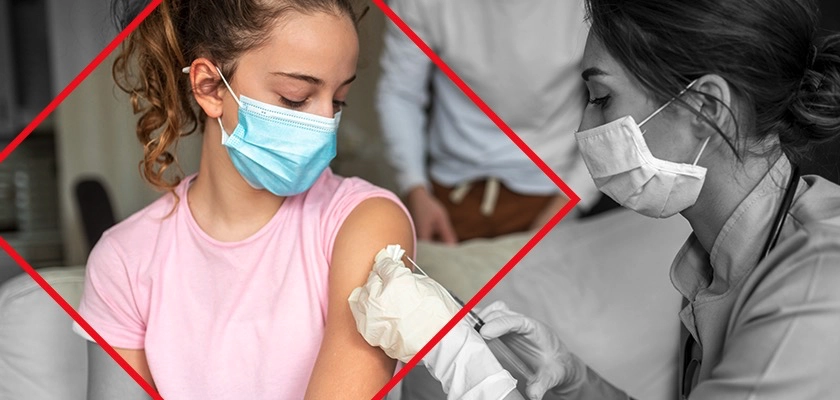"The COVID-19 Pandemic is Not Going Away-- This is Why" - Greg Lukasik, Ph.D. | November 2021
Despite efforts to vaccinate as many people as possible, COVID-19 infection rates are still increasing across the globe.
Florida Atlantic University

As Americans were preparing to celebrate the defeat of the deadly COVID-19 pandemic that ravaged the world for more than a year, they received some sobering news. The number of infections, despite increased vaccination efforts and a steady drop in infections and fatalities, began to go up again. Between June 21 and August 6, 2021, the number of new daily COVID-19 cases reported worldwide nearly tripled, going from 284,734 reported cases to 744,825.1
Why? The answer seems to lie in global inequality and ideological divides.
While many countries were turning the corner on the pandemic with the development of powerful vaccines, which proved to be over 90 percent effective against the virus, the global vaccination efforts proved to be a major obstacle to end the pandemic quickly. At the beginning of August 2021, wealthy countries such as the United States, Canada, Germany, and France had at least 50 percent of their populations fully vaccinated. At the same time, in the poorest countries of Africa, Asia, and Latin America, only 1–5 percent of the population was vaccinated. In South Sudan, Haiti, and Congo, this figure was less than 0.1 percent.2
This global divide in vaccinations means that the COVID-19 pandemic will linger as it ensures a large pool of unvaccinated people to whom the virus can spread. As the virus spreads, it can mutate, resulting in even more deadly and more contagious strains. This is why there are increasing calls on governments of wealthy countries to bridge the global vaccination gap. On August 10, 2021, a group of more than 175 public health experts, scientists, and activists sent a letter to the White House urging the Biden administration to take actions to tackle the pandemic globally, warning that “without immediate action to inoculate the rest of the world, newer variants are likely to emerge—including ones that may evade vaccines’ protection.”3 These experts and activists call on political leaders in wealthy countries to share their stockpiles of vaccines and the knowledge of vaccine production with poorer countries and to break the patent monopoly of pharmaceutical firms to these vaccines.4
There are other reasons for the slow progress. The anti-vaccine movements in many countries have convinced many people that vaccines, including COVID-19 vaccines, are dangerous. In reality, the COVID-19 vaccines that have been approved for use are very safe, with a mortality rate among people who received the vaccine in the United States of less than 0.0002 percent.5 In contrast, the mortality rate from COVID-19 in the United States is 1.7 percent.6 However, in spite of this evidence, about a quarter of Americans refuse to get vaccinated, a fact that worries medical experts.7
Politics clearly plays a role. Many medical experts were critical of President Trump for downplaying the seriousness of the pandemic and refusing to wear a face mask. Today, a number of prominent politicians, including the governors of Texas and Florida, continue to undermine steps that would help slow the spread of the virus. In Florida, Republican governor Ron DeSantis threatened to withhold funding from school districts for imposing mandatory face masks.8
In Texas, the city of San Antonio is suing Republican governor Greg Abbott over his executive order barring local governments from imposing mask and vaccine mandates. In North Carolina, Republican legislator Madison Cawthorn denounced masking rules approved by county school board members in his district, calling them “nothing short of psychological child abuse.”9
These mixed signals from political leaders about the nature of the pandemic and their refusal to implement public safety measures to halt the spread of the virus have consequences. In many states, residents have mobilized, largely along the party lines, either in opposition to or in support of government mandates to require vaccinations or to wear masks in public places. According to the Monmouth University polling conducted in early August of this year, 73% of Republicans oppose bringing back masking and social distancing guidelines, while 85% of Democrats support doing so.10 According to surveys the Kaiser Family Foundation conducted between April and July 2021, partisanship is driving the gap in vaccinations. In counties that voted for Biden, the vaccination rate is 46.7 percent, while the vaccination rate in counties that voted for Trump is 35.0 percent.11
As a result, in states where the political leadership is against government mask mandates or other public safety measures, such as Florida and Texas, the pandemic is raging on. And the consequences of the opposition to COVID-19 vaccination are clear in IC units in hospitals across the country where unvaccinated individuals comprise more than 90 percent of all COVID-19 ICU patients.12
As millions of schoolchildren, college students, and teachers are starting the school year, we as a society have the responsibility to rely on objective scientific knowledge and the expertise of health professionals, without political bias, to get vaccinated and follow public health guidelines that have been proven effective against the pandemic. We must also embrace our fellow humans living in countries without the resources to vaccinate their populations. We must also heal the political divisions at home. Regardless of race, political affiliation, or socioeconomic status, we are in it together.
Questions for Discussion
- What insight can we gain from sociological research when it comes to explaining the reluctance of many people to get vaccinated?
- Based on the insight gained from more than a year and a half of the battle against the Covid-19 pandemic, can the development of powerful vaccines alone win that battle?
- Why must we pay attention to the social factors that influence human behavior when it comes to our efforts to end the Covid-19 pandemic?
References
- Suliman, Adela, Pietsch, Bryan, and Amy Goldstein. (2021, August 2). U.S. hits Biden’s vaccination goal a month late, with 70 percent of adults receiving at least one shot. Washington Post. https://www.washingtonpost.com/nation/2021/08/02/coronavirus-covid-live-updates-us/
- Holder, Josh. (2021, August 11). Tracking Coronavirus Vaccinations Around the World. The New York Times. https://www.nytimes.com/interactive/2021/world/covid-vaccinations-tracker.html
- Diamond, Dan, and Yasmeen Abutaleb. (2021, August 10). “Act now” on global vaccines to stop more-dangerous variants, experts warn Biden. Washington Post. https://www.washingtonpost.com/health/2021/08/10/health-experts-demand-global-vaccines-pandemic/
- Ibid. See also Suwando, Peter, Hassan, Amir, and Rachel Moreski (2021, June 4). It’s Time For A Biden Plan To Help Vaccinate The World Against COVID—And End This Pandemic For Good. Here’s What It Should Include. Health Affairs. https://www.healthaffairs.org/do/10.1377/hblog20210602.449322/full/
- Selected Adverse Events Reported after COVID-19 Vaccination (2021, August 17). Center for Disease Control. https://www.cdc.gov/coronavirus/2019-ncov/vaccines/safety/adverse-events.html
- Mortality Analyses (2021, Aug.20). John Hopkins University. Coronavirus Resource Center. https://coronavirus.jhu.edu/data/mortality
- Brumfield, Geoff. (2021, April 7). Vaccine Refusal May Put Herd Immunity At Risk, Researchers Warn. National Public Radio. https://www.npr.org/sections/health-shots/2021/04/07/984697573/vaccine-refusal-may-put-herd-immunity-at-risk-researchers-warn
- Hernandez, Joe, and Deepa Shivaram. (2021, Aug.6). Some Florida School Districts Will Require Masks. The Governor May Cut Their Funding. National Public Radio. https://www.npr.org/sections/coronavirus-live-updates/2021/08/06/1025192746/some-florida-school-districts-will-require-masks-the-governor-may-cut-their-fund
- Will, Weissert. (2021, August 12). Republicans take to mask wars as virus surges in red states. AP News. https://apnews.com/article/joe-biden-health-coronavirus-pandemic-fcd36bc56f03fcd46d9ad5839a7b5702
- Ibid.
- Kates, Jennifer, Tolber, Jennifer, and Kendal Orgera (2021, ). The Red/Blue Divide in COVID-19 Vaccination Rates is Growing. Kaiser Family Foundation. https://www.kff.org/policy-watch/the-red-blue-divide-in-covid-19-vaccination-rates-is-growing/
- Abdelmalek, Mark, Mitropoulous, Arielle, and Erica Baumgard. (2021, July 29). Vast majority of ICU patients with COVID-19 are unvaccinated, ABC News survey finds. ABC News. https://abcnews.go.com/US/vast-majority-icu-patients-covid-19-unvaccinated-abc/story?id=79128401

